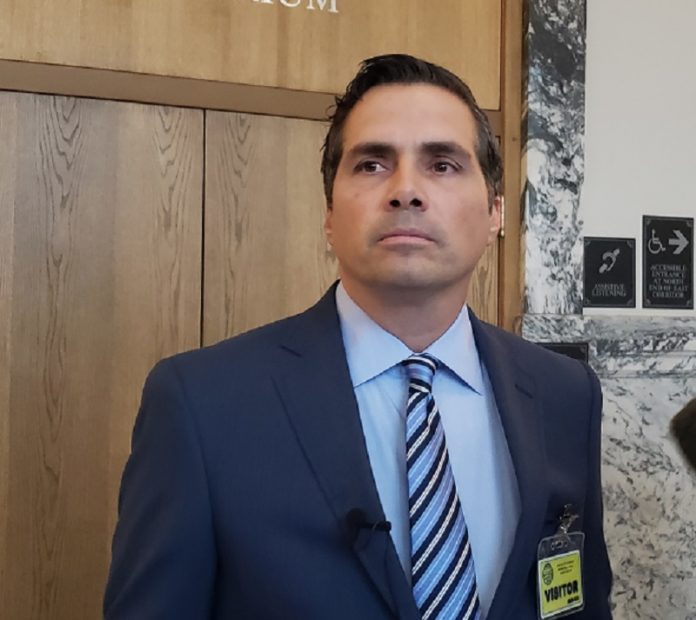(Updated to reflect comments from Assisant Secretary of State Eric Rucker; inserts comment from Kelly; inserts home addresses of some signature collectors; adds comment from Pedro Irigonegaray)
Independent candidate Greg Orman scored a key victory Thursday when a state elections panel rejected a series of challenges that would have kept him off the ballot in the Kansas governor’s race.
The state Objections Board voted to dismiss the objections filed by Democrats disputing thousands of signatures on Orman’s petition. The objection had been filed by Will Lawrence, chief of staff for Senate Minority Leader Anthony Hensley.
The decision essentially cements Orman’s place on the ballot against Democratic state Sen. Laura Kelly and Republican Secretary of State Kris Kobach. No decision has been made whether to appeal the case in court.
Orman’s presence on the ballot is generally viewed as a threat to Kelly in the general election, potentially siphoning away voters that might otherwise go to the Democratic nominee in a head-to-head contest with Kobach.
“What we’ve seen here today is nothing more than the Democrats trying to deny me access to the ballot,” said Orman, who appeared at the hearing on Thursday morning. “They don’t want to give voters a real choice in November.”
Orman said Democrats were trying to silence the voice of thousands of Kansas voters by objecting to the signatures on his petition. “They’re more interested in the acquisition of power than adhering to their principles.”
The Johnson County businessman then took a sharp jab at Kelly.
“The Democrats profess to be the party that stands for voters,” Orman said. “I think the only person more interested in suppressing votes in Kansas than Kris Kobach is Laura Kelly.”
Kelly sidestepped Orman’s comments, issuing a statement saying she’s the candidate to beat this November.
“Laura Kelly remains the only candidate in this race who is putting the best interests of Kansas families first,” said spokeswoman Johanna Warshaw.
“She is the strongest candidate to win in November – no matter who else is on the ballot.”
Pedro Irigonegaray, the lawyer representing Lawrence in the case, said Orman should be ashamed of the sloppy petitions that were submitted.
“What Orman ought to be saying is that he apologizes for the manner in which those signatures were acquired because of the immense number of irregularities that came about as a result of a lack of supervision and attention to detail,” Irigonegaray said.
“If that’s the way he runs this part of the campaign, how is he going to govern,” he said.
Orman submitted more than 10,000 signatures on the petitions he submitted to get on the ballot as an independent in the governor’s race. He needed only 5,000. The state validated about 7,700 of the signatures and discounted about 2,000 others.
However, Democrats challenged thousands of those signatures, citing a number of issues such as the qualifications of the workers circulating the petitions and whether the petitions were notarized properly.
Democrats withdrew one of their largest objections, which challenged whether more than 6,000 signatures should be counted because the counties verifying the petitions returned them to the state after the 10-day deadline set by law.
They reconsidered their argument after concluding that it would be unfair to tie Orman’s candidacy to the action of the counties.
The hearing ultimately centered on about 3,600 signatures gathered by five signature collectors hired by the Orman campaign with questionable addresses that made it hard to determine whether they complied the state law.
Democrats argued that because some signature collectors did not list their address on the petitions, there is no way to know for sure whether they comply with the state law. They also argued in other cases that the addresses on the petition could not be confirmed, raising further questions about complying with the law.
A couple of the signature collectors listed addresses such as the Liki Tiki Village resort in Florida, a homeless shelter in Salt Lake City and a WoodSprings Suite in Sioux Falls, S.D.
Under state law, signature collectors must be eligible to vote in Kansas, meaning they have to be at least 18 years old, a U.S. citizen and not have a felony conviction on their record.
Without knowing for certain where the signature collectors live, Lawrence argued that state law can’t be enforced – there’s no way to know whether they have been convicted of a felony or whether they are even citizens.
Kansas City lawyer Mark Johnson, representing the Orman campaign, argued that the Democrats had failed to meet the burden of proof to show that the petitions were insufficient.
At one point during the day-long hearing, the governor’s legal counsel, who filled in on the panel for Lt. Gov. Tracey Mann, raised the possibility of investigating five of the signature collectors. Brant Laue’s proposal was rejected, however.
Ultimately, the Objections Board sided with Orman.
Assistant Secretary of State Eric Rucker sat in on the panel for Kobach who recused himself from the proceedings.
Rucker said the Democrats didn’t meet their burden of proof when weighing the objection against the rights of voters who signed the petition.
“When you compare the irregularities that occurred in this petition against the rights of individual voters to express their will as it relates to nominating a candidate for any public office, those irregularities often times will bend to the greater consideration of the rights of those people to express themselves politically,” he said.
The objections lodged against the petition raised several questions:
- It claimed that individual notaries completed the notary section of each petition page without witnessing the signature of the person circulating the petition.
- The petitions contained a “substantial” number of notary dates on the signature pages that appear to be the same regardless of the dates the signatures were collected. “These instances are not likely possible unless notaries were dispensing the legal requirement of personally witnessing the signature of the affiant on each of these signature page.”
- The objections letter said there are “serious” questions about the qualifications of the individuals circulating petitions for the Orman campaign. Lawrence alleges that 323 signatures were gathered by someone with a felony drug conviction. Under state law, that person would be barred from circulating a petition because they would not be eligible to vote with the conviction.
- The objection also challenges the people hired from out of state to collect petition signatures. It questions one person collecting signatures whose address cannot be located, leaving doubt whether that person is eligible to circulate a petition in Kansas. It also notes that one person collected 1,004 signatures from 20 different counties from July 25 to July 31, meaning they would have had to gather one signature every 41/2 minutes if they worked 11-hour days with no breaks for seven straight days. “This statistics cast serious doubts as to the validity of the signatures.”
















